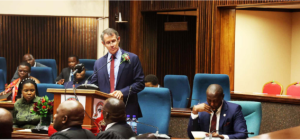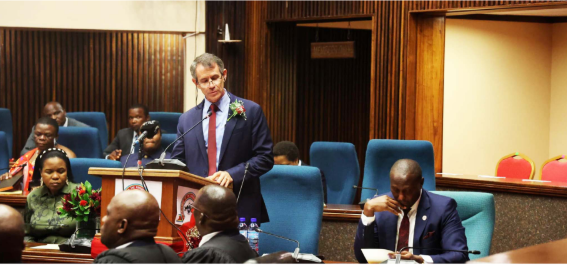By Ncaba Ntshakala
The Eswatini government has reinforced its commitment to expanding international trade, supporting small and medium enterprises (SMEs), and ensuring a competitive market landscape as part of its 2025/26 national budget.
The Minister of Finance Neal Rijkenberg highlighted these priorities while delivering the Budget Speech and National Budget Estimates at the second session of the 12th Parliament, emphasizing strategies aimed at boosting the country’s economic resilience and market participation.
International trade remains a cornerstone of Eswatini’s economic policy, with the government focusing on strengthening its export footprint through regional and global agreements.
“The Government is strategically focused on amplifying Eswatini’s export footprint through comprehensive trade agreements, including SACU, SADC, COMESA, and AfCFTA,” stated Rijkenberg.
RELATED: Eswatini exporters must embrace E63.7 trillion AfCFTA market
A key aspect of this strategy is the ongoing negotiation process within the African Continental Free Trade Area (AfCFTA), particularly in sensitive product categories.
The government is also pushing forward discussions on the Tripartite Free Trade Area, which will further integrate Eswatini into continental trade networks.
To support this vision, implementation plans such as the AfCFTA Implementation Strategy and the SADC-EU Economic Partnership Agreement Strategy have been prioritized, with extensive stakeholder engagement and capacity-building workshops playing a crucial role in ensuring smooth execution.
The budget also underlines the government’s continued support for micro, small, and medium enterprises (MSMEs), recognizing their critical role in economic development, job creation, and innovation.
The Small Enterprises Development Company (SEDCO) remains a central player in this agenda, rolling out key initiatives such as the Entrepreneur of the Year Awards and the Business Incubation Programme.

Budget Estimates at the second session of the 12th Parliament
These programs are designed to strengthen enterprise development, digital integration, and market competitiveness among MSMEs.
Rijkenberg noted that legislative advancements, particularly the Citizen Economic Empowerment Act, will further entrench MSMEs in the country’s economic fabric by ensuring that local businesses receive enhanced opportunities for growth.
“SEDCO’s pivotal role in MSME advancement is marked by programs such as the Entrepreneur of the Year Awards and the Business Incubation Programme, which foster enterprise development and digital integration,” he stated.
Again, market competition and consumer protection have also been elevated as key priorities in the 2025/26 budget, with the Eswatini Competition Commission playing a crucial role in ensuring fairness and transparency in the business environment.
RELATED: 30 million people to be lifted out of poverty through AfCFTA, says PM
The Commission, by addressing anti-competitive practices and regulating mergers, has strengthened greater investor confidence in the country’s economy.
Over the 2024/25 financial year, the Commission approved 28 mergers, indicating steady business activity and market expansion.
Consumer protection efforts have also yielded significant results, with the Commission achieving a 98 percent resolution rate on consumer complaints and securing substantial compensation for affected individuals.
“The Eswatini Competition Commission is instrumental in fostering a competitive business environment, critical for economic vitality,” Rijkenberg noted.
He emphasized that proactive market monitoring has been effective in preventing excessive pricing and ensuring that businesses operate transparently.


